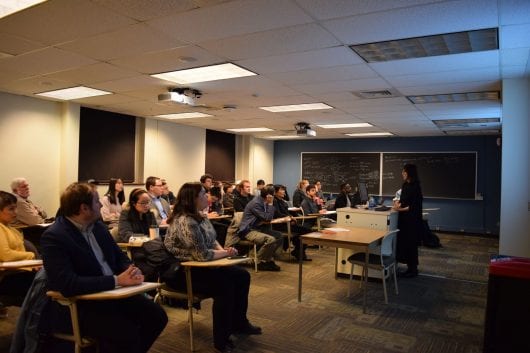
Asako Osaki gives a talk on women’s empowerment in Japan on Wednesday in Ramseyer Hall. Credit: Momina Tashfeen | Lantern Reporter
On Wednesday, Asako Osaki, a policy and advocacy expert specializing in gender mainstreaming and empowerment of women and girls, spoke at Ramseyer Hall about the advancement of women in Japan’s labor force.
The event was co-hosted by the Institute for Japanese Studies and the Consulate General of Japan in Detroit. Support for the event came from a U.S. Department of Education Title VI grant to The Ohio State University East Asian Studies Center .
Etsuyo Yuasa, director of the East Asian Studies center, said despite movements such as #MeToo supporting women worldwide, Japan is still behind in supporting its women.
“Japanese gender equity is very notorious and in the world ranking, Japan is 110 or something,” Etsuyo Yuasa, director of the East Asian Studies Center, said. “For an advanced country, it’s not a very good situation.”
Following introductions, Osaki began by summarizing the scope of her work at the United Nations Development Programme, where she served as the program manager at the Bureau for Development Policy.
“My role was to help developing countries achieve gender equality and women’s empowerment, which is a set of goals agreed upon by all member states of the United Nations, ” Osaki said. “I was actually managing the global fund to do projects in different countries.”
The projects were focused on aiding countries in implementing the elimination of all forms of discrimination against women, a concept Osaki refers to as the global “norm.”
Osaki has attended many conferences and noted that women empowerment efforts are on the rise, but aren’t the focus of the UN exclusively.
“Women empowerment has become one of the priorities for the government of Japan under Prime Minister [Shinzo] Abe,” she said.
Despite never mentioning women’s advancement in his policy discussions in 2005, Abe’s focus in 2012 — his comeback year after serving a brief interim term as prime minister from 2006 to 2007 — was all about the empowerment of women, Osaki said.
“Achieving gender equality is not just the right thing to do, it’s the wise thing to do,” she said. “The World Bank started to look at the impact of investment in the economic empowerment of women in developing countries. In their analysis, they’ve decided that gender equality and the empowerment of women is a good investment.”
When mothers are empowered through education, health or economic independence, that directly translates into the welfare of the rest of her family members, especially children, Osaki said. This trickling down is what she calls the “domino effect.”
“The investment in women empowerment doesn’t just stay with women,” she said. “If you have more families like that, the wellbeing of the community members is uplifted, and the country as a whole becomes healthier, more educated and more productive.”
When comparing and contrasting the typical gender roles, Osaki pointed out the rate of unpaid and paid work by gender and how this is a major indicator of gender inequality. Women’s unpaid work includes household duties and being caretaker of the young or elderly, which isn’t perceived as empowering, and instead gets in the way of pursuing an education or career.
“Both [the] man and woman work, but one type of work gives you power and comes with money, the other type of work, although important, it doesn’t come with power,” Osaki said.
However, the times have changed.
Presented on a graph, Osaki showed a significant increase in dual-income households in Japan from 1980 to 2016. There is a significant decrease in single income households in the same years.
Another set of statistics shows trends that suggest the ratio in aging population and new labor force is imbalanced, suggesting serious economic and physical implications.
“This is going to mean the shortage of labor force, and that’ll have an implication on the tax revenue and social security because we’re going to have a huge old population and a small productive population,” Osaki said.
It’s in this context, the prime minister introduced the idea of a society in which women are empowered to enter the workforce in order to sustain and encourage growth.
“He said he was going to increase women’s labor participation and increase the percentage of women in decision making and leadership positions in public and private sectors, he even came up with a numerical target of 36 percent increase,” Osaki said.
Abe made this pledge to the world and presented his growth strategy to the UN, World Economic Forum, and The New York Stock Exchange, making it an international commitment.


